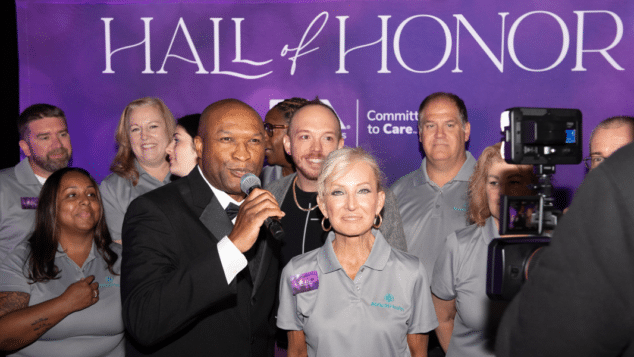Turning Members’ Insight Out

 |
Managing Director, Marketing and Communications, AIHA®, the American Industrial Hygiene Association, representing industrial hygienists dedicated to occupational safety and health (aiha.org) |
 |
Chief Operating Officer, Leadership Greater Chicago, the region’s premier convener, connector, and mobilizer of bold leaders to effect transformative civic impact across Greater Chicago (lgcchicago.org) |
 |
Senior Director of Communications, Publications and Governance, National Board of Certification and Recertification for Nurse Anesthetists (NBCRNA), dedicated to promoting patient safety by enhancing provider quality in the field of nurse anesthesia (nbcrna.com) |
As association leaders you have a sense of who your members are – the average age, trending demographics and even their likes and dislikes. But perceptions and the value your members place on your association can change quickly, making it more important to tap into their mindset from time to time.
An effective way to capture insights from a diverse membership base is through focus groups. Gathering a small group of members representative of all corners of your membership, can lead to extraordinary learnings, which can lead to anything from a change in website content to a shift in strategic direction, new programming, marketing initiatives and more. At times, insights support observations from staff and volunteer leaders, who have more substantive proof to support those anecdotal evidence. Additionally, members value volunteering and engaging with their associations, so they are often honored to be asked to participate in these sessions.
FORUM spoke with three executives about how they use focus groups to keep their finger on the pulse of their membership.
FORUM: What has your organization done to gather insights from members?
Marchese: AIHA relies heavily on member feedback…and, they love to share it. In fact, our average member survey response rate is 45%. Being cautious not to overdo it, we conduct various surveys with the help of outsourced research firms, annually or otherwise (i.e. member needs survey, environmental scans, focus groups, etc.) as well as conduct surveys in-house on specific topics (i.e. biennial readers’ survey for our magazine, post-conference evaluations, public policy survey, etc.). We value our members’ feedback so much that whether we implement their changes right away, or not, their insights help us rethink how to offer them a better member experience.
Carstensen: We conduct online surveys immediately following each session of our formal leadership development programs, as well as the educational events we host for our Fellows, supporters, and the public. The purpose of these surveys is to collect both quantitative and qualitative data to inform how we shape future programs, from content, logistics, and registration to marketing, speaker/sponsor selection and preparation, and fundraising.
When we developed our new website and Fellows intranet, we conducted multiple focus groups by phone (individual) and in-person (group)—in addition to online surveys—to better understand the needs of the user and test their reactions to functionality and template designs. The direct interaction participants had with the platform, and the opportunity to have a discussion about their experience, were invaluable to the quality of the product we delivered.
Kamen: In moving to a new professional certification program after 40 years, the NBCRNA sought input from its certificants in numerous and regular ways. This included focus groups—taking advantage of having a wide variety of certificants in person while at large, nationwide conferences, an all-certificant email survey, and feedback from in-person presentations and discussions.
FORUM: How has your association benefitted from insights gathered during focus groups?
Marchese: AIHA members are usually so forthcoming on the surveys we email to them. They will praise us or cut us down to size in an instant, never holding back their opinions. I thought that in a focus group setting our members would tone down their opinions or, in many cases, not share what was on their mind since they were in front of their peers.
The insight that I walked away with from conducting focus groups pertaining to our brand refresh project over the past few years was that our members were just as comfortable to share their insights in person as they were on paper…in fact, even more so. Their insights were full of passion, but all were completely constructive.
Carstensen: A sustainable competitive advantage in the marketplace relies on data, operational excellence, and brand awareness.
In February of this year, we launched a new leadership development initiative called The Daniel Burnham Fellowship. This Fellowship is an accelerated civic onboarding experience for senior executives new to Chicago or new to their role. The Fellowship is designed to inspire these leaders to mobilize and exert their combined influence and intellect to positively impact Chicago, its future, and the continued economic progress of the region. The inaugural cohort of 20 senior executives, primarily from the corporate sector, completed the Fellowship in June.
Within 6-8 weeks of completing the inaugural Fellowship, we held three 90-minute, in-person, moderator-led focus groups ranging from 2-5 participants. Questions ranged from delivery on purpose and design and overall experience to schedule, logistics, impact of experience on day-to-day business life, and future engagement with the Fellowship and the organization.
The data was shared with staff and the board of directors, the body of leaders who endorsed the development of the program.
The information collected during the focus groups shed light on both personal and group feelings, perceptions, and opinions about the experience. This format also allowed us to gather a broad range of quality information in a short period of time, which is critical in an age where data moves at the speed of light. We obtained clarity on what worked well and where we have opportunities to enhance our delivery. Additionally, the insights helped further shape our recruitment strategies, marketing approaches, and overall messaging.
Kamen: This is an invaluable addition to any initiative to elicit input from stakeholders. The qualitative information gained from strategic, in-person discussions has provided us with the necessary input to retool messaging, given us ideas for new products or offerings, and helped alter the direction of some of our programs and even our website. Paired with quantitative data, you can develop a fully-informed communications plan.
FORUM: Can you provide an example of how your association has used insights from a focus group to develop a new program or marketing initiative or change direction on strategy?
Marchese: AIHA has been undergoing a brand refresh over the past 3 years (revisiting the organization’s name/look/feel, positioning and messaging the role of the profession and organization with external audiences), and at the heart of the project was conducting various focus groups. Going into the first focus groups, staff had a hypothesis that the membership was not going to want to change the name of the organization…and in fact that turned out to be the case. However, in a different focus group about a new brand logo, the members’ insights proved that we needed to go back to the drawing board for the artistic renderings we presented to them.
Carstensen: The insights collected during the focus groups with the Daniel Burnham Fellows significantly influenced a complete rebranding of this new leadership development experience. The feedback helped us better understand how to approach and communicate with C-suite executives, from imagery, color palette, and design, to messaging, format, and delivery. The result was a new brand style guide, an eight-page peer-to-peer brochure available in both print and digital formats, and a PowerPoint template for recruitment presentations.
Kamen: Following our credentialing board’s move to a new, multi-faceted certification criteria program, an overarching and far-reaching educational communications initiative was undertaken to ensure a smooth transition. Part of the new program introduced a performance-standard exam for which certificants would receive feedback on their performance. “But how much information is too much, too little, and helpful to support lifelong learning without data being potentially used against them?” Focus groups helped inform our decision [on how to best communicate certificants’ performances on the exams].
FORUM: What are two recruitment strategies you have implemented to keep focus groups diverse?
Marchese: Pulling the right lists from our database to identify the age and career stage of each participant was a must in order to get a diverse representation of our members and non-member customers (especially since our brand refresh project was hinged on taking a stalwart, 80-year old brand and making it appeal to the next generation of these professionals). Another important strategy we incorporated in the process was including non- leader and leadership input. We knew that we didn’t only want representatives who were just peripherally involved, nor only members who were constantly involved in the organization…but a mix of both in order to get a sense from both audiences.
Carstensen: Know your audience. Because we were conducting focus groups with those who participated in our pilot program, we were intimately familiar with their backgrounds. We offered multiple dates and times for our focus groups, and based on responses we assigned participants to a session. This intentional process ensured each focus group was diverse in gender, ethnicity, industry, tenure in the C-suite, etc.
Secure a credible moderator. When we invited our Daniel Burnham Fellows to participate in a focus group, we included the name and bio of the moderator we had selected. Because of the moderator’s affiliation with our organization, reputable background, and industry knowledge, our Fellows were more willing to allocate 90-minutes of their time for this discussion. This resulted in a larger pool of participants, which increased the diversity of the overall audience.
Kamen: We recognize that diversity means different things to different organizations. Although we want diversity, we also want to ensure that the group participants have commonality—in our case, all Certified Registered Nurse Anesthetists (CRNAs)—but don’t have to have similar opinions about the topics we’d planned to discuss. For us, diversity meant certificants at different stages of their careers and different practice settings (e.g., hospital, academic, private practice).
- For one focus group initiative, we intentionally sought participation from members of a variety of committees that had known, diverse demographics (e.g., practice type/setting)
- Another method we’ve used has included day-of recruiting at the profession’s annual conference, approaching a variety of attendees and inferring their practice setting from their badge information. The random selection of the on-site approach has worked well for us.
FORUM: What are the top recommendations you have for an association executive considering conducting focus groups of members?
Marchese: Be judicious when deciding on your list, making sure to narrow the prospective participants into the areas you had hoped to get insights from.
Consider giving an incentive for members’ participation. A simple $50 gift card to represent how you value their time goes a long way.
And, once the focus groups are wrapped up, reports written and plans implemented, remember to tell your members what the outcomes were. Sometimes, we as staff think that market research is just for us to learn behaviors and change things, but we often lose sight of the fact that the members themselves like to know the outcomes. It gives them more buy-into the changes that may be on the horizon.
Carstensen: Just do it! There can be focus groups for anything – product/program focus groups, service improvement focus groups, or merely idea generation. Whether your organization is developing a new website, wanting feedback on customer service, or interested in trying out a new idea, a well-planned focus group with clear objectives can help provide clarity and direction before you commit funds to make changes.
Your members AND your employees are the greatest contributors to your business. Take time to tap into these invaluable resources for feedback, comments, opinions, and attitudes about topics that can improve your organization. Your investment will result in greater engagement, deeper relationships, and a higher level of ownership in future actions.
Hire the right moderator. You want a trained, experienced moderator with category experience. And someone who can manage, moderate, analyze, and report. Professional moderators know how to guide group discussions, manage group dynamics, and draw out relevant information. They are adept at exploring and probing unexpected items as they arise during the discussion, yet still keep the discussion on track. Don’t settle for anything less.
Kamen: Don’t be afraid to ask the “tough” questions in the focus group—those hot-button topics being discussed on social media, etc., about which you have seen incorrect information being spread amongst your membership. This in-person opportunity is invaluable in finding out what your members are really thinking and feeling and will give you information that may help you create or re-tool your messaging to address misinformation, misperceptions and opinions.
Focus groups are more time and cost effective than individual (phone or in-person) interviews, while providing the live feedback. They allow you to investigate complex feelings and behaviors for a deeper understanding that can inform your decision-making, strategic planning, and resource allocation.
Bonus recommendation: Consider who will conduct your focus group based on resources, timing, and the topic. With topics very specific to our profession or more administrative, staff has conducted the focus group. However, we have found that with sensitive or “hot” topics, in particular, it has been beneficial to use a third party to discuss the issues with the focus group to help ensure genuine feedback.
Tags
Related Articles
The Emergency Nurses Association Utilizes Design Thinking to Reimagine its Awards Ceremony
In a prime example of intrapreneurship, the ENA utilized design thinking to innovate within the...
Report Reveals Strategies to Overcome Membership Decline
McKinley Advisors’ Membership Reset report provides a roadmap that association leaders can use to refocus...
Member Retention: More Than Just a Number
Learn how the AANA used humor and multichannel marketing to win back lapsed members.




